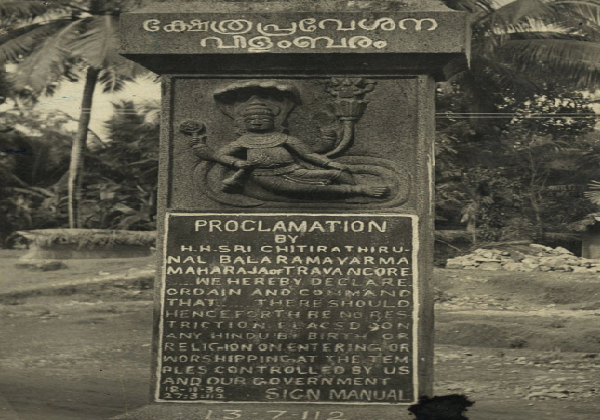Kerala has witnessed many social movements in its lengthy history. It was once in the grip of many antiquated beliefs and customs. The progress from those oppressive habits came from the work of many activists and movements. The Kshetra Pravesana Vilambaram (Temple Entry Proclamation) of Thiruvithamkoor on 12 November 1936 is an unforgettable page in the history of Kerala, when it comes to the rennaissance. It was almost the death knell for the racial prejudices that had been prevailing in Kerala society until then. The proclamation was made by the erstwhile and the last king of Thiruvithamkoor, Sri Chithira Thirunal Rama Varma. On his 24th birthday, he proclaimed that all Hindus by birth or faith, despite their castes, will be allowed entry to all temples under the governance of Thiruvithamkoor government. The event charted a new course in the history of Kerala and India.
The Temple Entry Proclamation issued by Maharaja Chithira Thirunal Balarama Varma in 1936 abolished the ban on the so-called ‘low-caste people’ or avarnas from entering Hindu temples in the Princely State of Travancore . The proclamation was a milestone in the history of Travancore and later in the rest of Kerala as well. Today, the Temple Entry proclamation day is considered as social reformation day by the Government of Kerala. The proclamation was made by the erstwhile and the last king of Thiruvithamkoor, Sri Chithira Thirunal Rama Varma. On his 24th birthday, he proclaimed that all Hindus by birth or faith, despite their castes, will be allowed entry to all temples under the governance of Thiruvithamkoor government.
The event charted a new course in the history of Kerala and India. The temple entry proclamation was the end result of the many crusades led by the social activists against casteism and the racial prejudices. The Ezhava Memorial, Vaikom Satyagraha, Nivarthana Prakshobam and Guruvayoor Satyagraha had already triggered many waves in Kerala society and the temple entry proclamation was a perfect successor to them. In the wake of these movements, Chithira Thirunal created a committee to study the different aspects of allowing the untouchables entry to temples in 1932. Later in 1934, it was decided that every public road and inns and wells in the kingdom could be used by people of all castes. In 1936 November, as per the advice of Gandhi, a petition signed by 50,522 Hindus of forward castes was submitted to the king. The favourable decision of the committee and the huge public support to the cause encouraged the king to carry out the proclamation. The proclamation excited not only the people of Thiruvithamkoor, but also those of Kochi and Malabar. Even though it took some time, the entry proclamation of Kochi on 20 December 1947 was a continuation of this. The Madras government led by T Prakasam had passed the proclamation on 12 June 1947.
The Temple Entry Proclamation was praised from every corner. Gandhiji called the proclamation ‘the great wonder of modern times’. Subhas Chandra Bose and Sardar Vallabhbhai Patel hailed it as the herald of a new era in India. The universities of Benares and Andhra gifted Chithira Thirunal with honorary degrees. C Rajagopalachari opined that the proclamation brought was the dawn of a bright era in Hinduism.















Discussion about this post